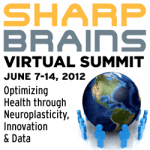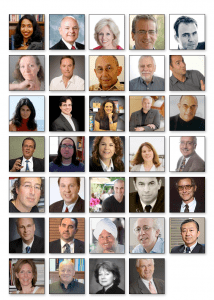190 Sharp Brains Issue a Call to Enhance Brain Health through Neuroplasticity, Big Data and Consumer Education
 -– SharpBrains Virtual Summit brings together global leaders and innovators to advance the emerging fields of applied neuroscience and brain fitness
-– SharpBrains Virtual Summit brings together global leaders and innovators to advance the emerging fields of applied neuroscience and brain fitness
The third annual virtual SharpBrains Virtual Summit: Optimizing Health through Neuroplasticity, Innovation and Data, held June 7–14th, concluded with a call to enhance brain health by harnessing neuroplasticity-based applications, big data platforms and consumer interest to augment the traditional reliance on disease-based pharmacological interventions and fragmented clinical trials.
The Summit brought together 190 researchers, decision-makers and practitioners across the technology, mental health, gaming and other sectors to discuss health optimization and applied neuroplasticity research and trends.
“We are glad to see a growing research-based toolkit to empower consumers, patients and professionals to maintain and enhance cognition and brain health across the lifespan,” said Alvaro Fernandez, the Producer of SharpBrains Summit, and summit speaker, adding that “This is a critical consideration as 84% of respondents to our 2012 SharpBrains survey agreed/ strongly agreed with ‘Adults of all ages should take charge of their own “brain fitness” without waiting for their doctors to tell them to.’”
“We cannot wait until 2025 for a “magic bullet” to be discovered, to cure (or end or prevent) Alzheimer’s disease and aging associated cognitive decline,” emphasized Dr. Peter Whitehouse, Professor of Neurology at Case Western Reserve University, adding that “We need a new culture of lifelong brain health to empower that 80% of the 38,000 adults over 50 surveyed in the 2010 AARP Member Opinion Survey who indicated “Staying Mentally Sharp” as their top ranked interest and concern, not to mention youth, workers and elders facing cognitive and emotional challenges.”
190 people attended the conference which featured more than 40 speakers, 8 plenary sessions and 5 educational workshops, on top of an Expo. To learn more about the full Agenda, go to: www.sharpbrains.com/summit/
- Brainomics: why Cognitive brain health is a major driver of economic growth – Dr. Sandra Bond Chapman, Director, Center for BrainHealth at The University of Texas at Dallas
- Crowdsourcing big brain data to improve public brain health – Dr. Robert Bilder, Chief of Medical Psychology-Neuropsychology, UCLA Semel Institute for Neuroscience
- Why Enriched Lifestyles build Cognitive Reserve and Health Capital – Dr. Yaakov Stern, Cognitive Neuroscience Division Leader, Columbia University
- Where are the Brain Shops – Dr. Kenneth Kosik, Co-Director, UC Santa Barbara Neuroscience Research Institute
- Integrative Neuroscience Databases to Transform Psychiatry – Dr. Evian Gordon, Executive Chairman, Brain Resource
- Revamping Alzheimer’s diagnosis and treatment – Dr. Peter Whitehouse, Professor, Case Western Reserve University
- Adapting our brain to augmented worlds – Nolan Bushnell, Founder, Atari,
- Consumer Bio-interfacing for Gaming and Wellness – Stanley Yang, CEO, NeuroSky
- Affordable, scalable brain monitoring through wireless EEG – Tan Le, CEO, Emotiv Lifesciences
- Monitoring Cognition in the Home Environment – Dr. Holly Jimison, Associate Professor, Oregon Health & Science
- Training brain networks underlying attention – Dr. Michael Posner, Professor Emeritus, University of Oregon
- Conditions to maximize cognitive training effectiveness – Dr. Adam Gazzaley, Director of the Neuroscience Imaging Center, UCSF
- How to Educate Consumers to be their own “Brain Fitness Coaches” – Alvaro Fernandez, CEO, SharpBrains
All sessions are archived. Reporters can request access and interviews by contacting SharpBrains.
About SharpBrains
SharpBrains is a market research firm devoted to helping organizations, professionals and consumers navigate applied neuroscience and brain health innovation. SharpBrains published The SharpBrains Guide to Brain Fitness, the first consumer guide to educate and inform adults on the subject, was recognized as a Best Book by AARP in 2011. Alvaro Fernandez, SharpBrains’ Co-Founder, was recently named a Young Global Leader by the World Economic Forum.
About the 2012 SharpBrains Virtual Summit
The annual SharpBrains Virtual Summit is the premiere global and virtual conference to discuss emerging neuroplasticity research, data-driven tools and innovative best practices to optimize health and performance across the lifespan.
Summit Agenda: 84% of respondents to a 2012 SharpBrains survey (n=3,165) agreed/ strongly agreed with “Adults of all ages should take charge of their own “brain fitness” without waiting for their doctors to tell them to,” and 78% agreed/ strongly agreed with “I would personally take a brief assessment every year as an “annual mental check-up.” This growing awareness demands new ways to harness neuroplasticity across the lifespan to optimize health, productivity and quality of life, and highlights market opportunities to develop and commercialize non-invasive solutions to monitor and enhance brain function. Meaningful, human-centered innovation to integrate lifestyle factors such as aerobic exercise with targeted interventions such as meditation, cognitive training and videogames, biofeedback and cognitive behavioral therapy will require engaging empowered and connected consumers, employees and patients where they are, going beyond current healthcare frameworks and channels.
The 2012 SharpBrains Virtual Summit gathered dozens of leading experts and over a hundred innovators and early-adopters to survey the state-of-the-art of applied neuroplasticity and cognitive science, and to address:
- How can empowered consumers navigate and integrate lifestyle/ technology options today?
- How can innovators and early-adopters help bridge existing gaps between knowledge and practice by 2015?
Summit Sponsors included: the Arrowsmith Program. Brain Resource, the Alzheimer’s Research and Prevention Foundation, Advanced Brain Technologies, AboutMyBrain and Bracket.
Summit Partners included a dozen university-based research centers and professional associations.



